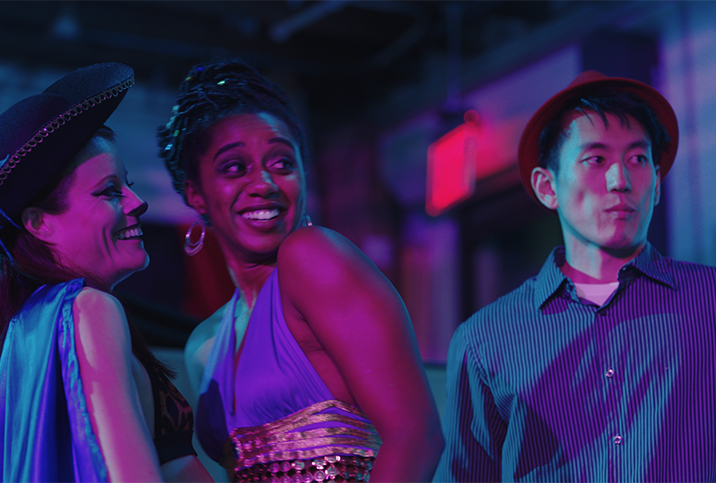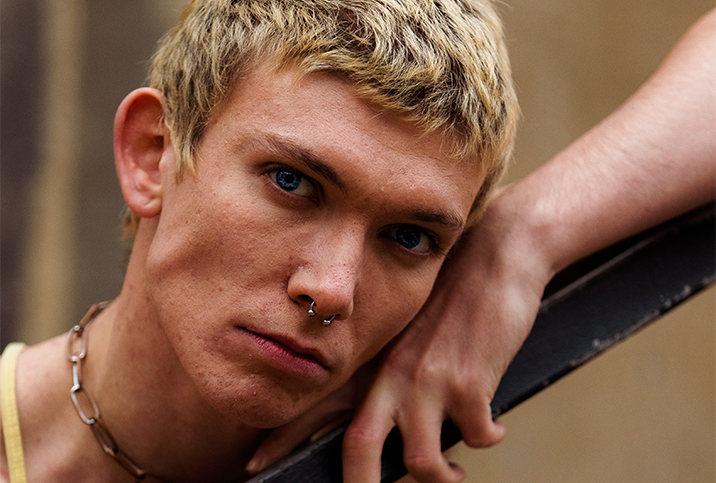More Movies About Messy Queer Polyamory, Please

For the past few decades, mainstream cinema has become increasingly inhospitable for storytelling about sexuality. Luckily for moviegoers, it's a void that independent filmmakers like Stephanie Sellars have always been eager to fill. Her movie "Lust Life Love," released in 2021, is a breath of fresh air for the way it finds beauty in a complicated queer polyamorous romance and for its pleasure-centered depictions of sex.
On the surface, "Lust Life Love" sounds like stories we've been told before about the adventures of a creative, privileged, sexually liberated white woman in New York City. There is something rather Dunham-esque about the way the main character's day job can't possibly support her, invoking the tulle-clad specter of Carrie Bradshaw.
But dismissing Sellars as unoriginal would be a mistake. What she's created is much more daring and dynamic than a certain HBO sitcom. For one thing, it treats queerness, kink and polyamory with respect, even reverence, and its characters value creativity rather than consumption.
Sweet and sexy
"Lust Life Love" hits a lot of technical sweet spots. It's independently produced but still highly polished. With its 100-minute running time, it's on the shorter side of feature length but makes every minute count. Best of all, the sex is explicit without being gratuitous, a balance many films fail to strike.
This is true despite the first sex scene occurring just two minutes in, a threesome among the main character, Veronica Willow (played by Sellars), and a couple she appears to be meeting for the first time. It's a sensual, passionate, joyful scene, ending in a sweet three-way kiss. It's a major departure from the primal rutting that often characterizes group sex onscreen.
"Lust Life Love" is keenly aware that the insular world it traverses with ease is wildly foreign to most of its viewers, but warns, with a wink, not to knock it till you try it.
This vibe is achieved primarily through the storyline of Veronica, a thirtysomething bisexual woman navigating a New York community of other sexuality professionals and enthusiasts. She's a sex blogger, one with such an engaged following that running into a reader on the street barely seems to faze her.
In fact, Veronica is pretty aloof in general. She's got a girlfriend, Joanne, with whom she seems more in lust than in love. She's got a thriving sex life beyond that union but finds that the end of an encounter can leave her feeling "nothing."
"There's no such thing as happily ever after," Veronica says broodingly in a voiceover. "There's no such thing as 'The One.'"
Going past positivity
As the film goes on, it becomes increasingly apparent that for the central characters, polyamory can be as much about escaping unpleasant realities as it's about genuinely exploring new frameworks for intimacy. Veronica longs to escape her oppressive family culture and the normative life it prescribes. Another of her partners, Daniel (Jake Choi), wants a way out of his unhappy marriage that doesn't make him feel like a failure.
It's this kind of unflattering emotional investigation into nonmonogamy that Connecticut-based writer and relationship educator Laura Boyle would love to see more of in entertainment. The author of "Ready for Polyamory: A Pragmatic Guide to Consensual Non-Monogamy," Boyle said she particularly wants to see more realistic depictions of jealousy and the process of working through it.
"Not the enormous, sexy blowout [fight], but the daily 'you got mad because this person went to your favorite restaurant without you knowing, and it was a conflict.' Which could be an absolutely perfect sitcom plotline," Boyle said.
It's not that polyamory stories don't have a range of narrative potential, it's that they're largely being written to connect with a monogamous audience. That can strip a story of much of the nuance required to portray polyamory more authentically.
"A lot of the time, we're looking at closed triads, or monogamous couples opening up to usually one partner," Boyle continued. "These situations are not the most common in real-life polyamory, but they're very much the most common onscreen."
New York-based intimacy and BDSM educator Blane, known online as Gawddess Blane, knows firsthand there are far more unique challenges to polyamory than we tend to see in the media. That's particularly the case for people who come from marginalized communities and are, therefore, more likely to have experienced precarity and witnessed its impact on relationships.
"If you've never seen a healthy, well-adjusted relationship before, it can feel like hell trying to manifest that for yourself, and then also to maintain it," Blane said.
Blane has practiced polyamory for over 10 years and is in a triad with two men who are also dating each other. In this relationship, identity-based experiences such as queerness, Blackness and immigration are far more likely to shape their dynamic than something like sex or jealousy.
She and her partners were caught off-guard by these realities. Years ago, in the early stages of navigating polyamory together, the few roadmaps and role models they could find centered on white people, such as those reared in middle-class, nuclear families.
Blane said the dearth of Black and/or queer polyamorous characters in the mainstream has meant a lot of suffering on the path to her romantic bliss.
"I also struggled with thinking that my relationship archetype had to look a certain way," she said.
Imperfection as authenticity
Of course, the goal is not for an individual movie to represent every type of polyamorous person in the course of one story. "Lust Life Love" is highly successful in depicting a specific polyamorous enclave and its mores. It also highlights, however inadvertently, how much recent storytelling about polyamory seems to conceive of the practice as an extension of a monogamous status quo, without doing much deconstructing of that norm.
We see Veronica grapple with that conflict toward the end of the film as she collects her thoughts for a documentary, but she stops short of connecting that tension to other oppressive social norms, particularly the ones she herself perpetuates. For example, when she discovers that Daniel went on a date with an escort, she explodes.
"I have nothing against sex workers, but what the f--k, Daniel?" Veronica howls, dissolving into tears. "Where are the boundaries?"
The enormous reaction, plus her refusal to clarify why exactly this bothers her more than him seeing any other woman, reveals that she does just hate the idea on principle and won't be honest with herself about it. It demonstrates that progressive queer polyamory leanings do not always guarantee sound politics.
That's exactly what makes "Lust Life Love" so compelling. Sellars has crafted a story with characters that feel true to life for their imperfections, even while steeped in the trappings of a hedonistic fantasy. Lust is a mighty force to be reckoned with, but as the film suggests, love might be even wilier.




















